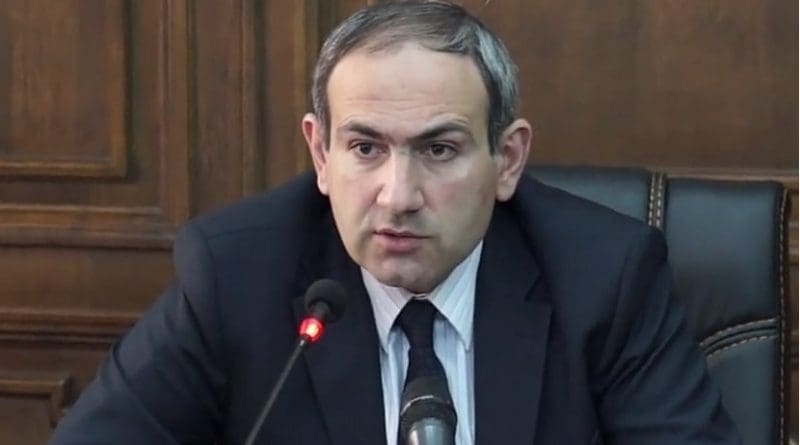Armenia’s Peaceful Revolution Yields New Leader
By EurActiv
By Sam Morgan
(EurActiv) — Armenia’s parliament voted in favour of a new prime minister on Tuesday (8 May) as the ‘love and solidarity revolution’ peacefully put the Caucasus republic’s opposition party in power.
Over the past month, mass public protests in Armenia, centred in the capital Yerevan, have managed to unseat former long-time president and would-be prime minister Serzh Sargsyan and install his political opponent Nikol Pashinyan as interim leader.
Sargsyan was the architect of political reforms that transferred the lion’s share of power from the president’s office to the prime minister’s. Many activists saw that as an attempt to put Armenia on an authoritarian pathway and people took to the streets in mid-April, when he assumed his new position, to make their concerns known.
The pressure worked: Sargsyan admitted he had “made a mistake” and resigned as prime minister on 23 April, opening the door for the former journalist and opposition leader Pashinyan to replace him.
The outspoken Pashinyan, who served time in jail for his role in the 2008 protests, failed on 1 May to secure enough support in parliament as Sargsyan’s Republicans refused to endorse his candidacy. A parliamentary session dragged on for over nine hours as Pashinyan faced a grilling from his political peers.
Many saw the question-and-answer marathon as an attempt by the ruling party to shine a light on the opposition leader’s perceived flaws and political inexperience, so as to erode his significant public support. But Pashinyan won widespread acclaim for the way he handled it.
In the week that followed, after substantial power brokering, 59 out of 105 deputies gave Pashinyan a tilt at leading the government, making him the first opposition politician to be appointed in the modern country’s history.
He has promised to trigger fresh elections within two to three months but will embark on a number of electoral reforms before then, as his Way Out Alliance believes the current system overly favours the Republicans’ voter base.
Not a flawless revolution
Republican politician Vahram Baghdasaryan said in a statement to parliament ahead of the vote that the love and solidarity revolution had actually directed a lot of “hate” against members of his party and urged Armenians not to retaliate against any politicians voting against Pashinyan.
Local sources revealed that protesters had actually camped outside the houses of Republican lawmakers, making noise until the small hours of the morning so that the deputies would not be able to get a decent night’s sleep.
In Republic Square in Yerevan, where thousands gathered to watch the proceedings, people turned their backs on the large screens when Baghdasaryan was speaking, chanting “go away” and flicking the politician a number of rude hand gestures.
But the weeks of protests were notable for their complete lack of violence and a small number of police interventions.
Aside from roads and the airport being cut off for short periods, the revolution actually happened without any of the aggressive incidents normally associated with an unexpected transition of power, although the EU criticised a crackdown on protesters on 22 April.
Pashinyan has yet to announce any ministers in his interim government but has already pledged that there “will not be any oligarchs” among his picks.
On Wednesday (8 May), he will travel to the disputed territory of Nagorno-Karabakh to celebrate an Armenian holiday that commemorates the “liberation” of the town of Shushi from Azerbaijan on 8 May 1992.
Armenia is locked in a complex dispute with its Muslim neighbour over Nagorno-Karabakh, which self-styles itself as the Republic of Artsakh and is pushing for independence, although it is largely unrecognised by the international community.
The Nagorno-Karabakh war lasted from 1988 to 1994 and left tens of thousands dead. Violence broke out again with the Four-Day-War in April 2016 but a tense ceasefire has survived ever since.
Armenia’s new acting prime minister insisted that the revolution has not jeopardised the security of his country but has in fact “strengthened it” and Pashinyan made sure his opening remarks before today’s vote centred on the Karabakh issue.
The disputed region has not had a place at the negotiating table for a number of years, since Armenia’s second president and Karabakh native, Robert Kocharyan, represented both actors during fruitless talks.
But Pashinyan told parliament he would work to ensure that Nagorno-Karabakh regains its influence.
The Armenia-Azerbaijan conflict is made all the more volatile by Russia’s backing of the former and Turkey’s support for the latter. President Vladimir Putin was the first world leader to congratulate Pashinyan on his victory, closely followed by EU foreign affairs chief Federica Mogherini.
Pashinyan was forced to spell out his intentions regarding Russia and Europe during the build-up to Tuesday’s vote. Pashinyan insists that he will not pull Armenia out of the Moscow-helmed Eurasian Economic Union, membership of which significantly changed the Brussels-Yerevan dynamic.
Talks on a Deep and Comprehensive Free Trade Area with the EU were scuppered in 2014, when a Sargsyan-led Armenia joined the Eurasian Union instead. Member states are now in the process of ratifying an alternative agreement.
Pashinyan hopes that work can now progress on a visa liberalisation programme, although that is unlikely until all EU28 have started implementing the so-called Comprehensive and Enhanced Agreement.
Fellow Caucasus nation Georgia, as well as Ukraine, both benefit from recently penned visa regimes.

